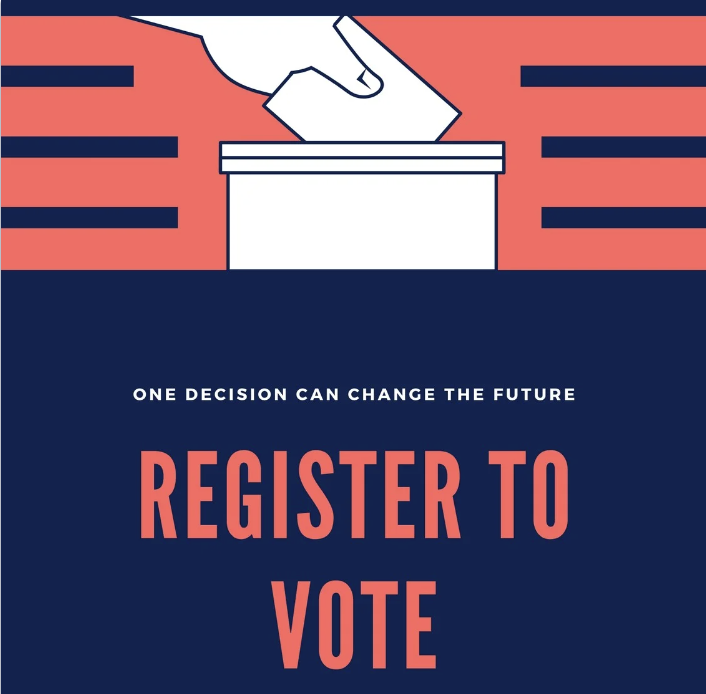
- Details
- By Neely Bardwell
Native Vote 2024. San Carlos Apache Tribe Chairman Terry Rambler is urging Tribal members 18 years and older to register to vote by Oct. 7 to be eligible to vote in the Nov. 5 presidential election even if they do not have documents proving U.S. citizenship. A U.S. citizen who lacks proof of citizenship can use the federal registration form and will be registered as a "federal-only" voter.
A federal-only voter is eligible to vote solely in races for federal offices.
The San Carlos Apache Tribe Council has also endorsed the Democratic Party presidential and vice-presidential ticket of Kamala Harris and Tim Walz.
“A recent U.S. Supreme Court ruling requires Arizona residents to submit proof of citizenship when registering to vote using a state voter registration form,” Chairman Rambler said. “However, a U.S. citizen can still register to vote without proof of citizenship by using a federal voter registration form.”
According to the Arizona Secretary of State’s office, 42,301 Arizona active and inactive voters were registered for only federal elections, as of July 1. Gila County reported 58 federal-only registrants and Graham County reported 47 federal-only registrants.
“It’s imperative that all tribal members who registered to vote in the past verify if they are still registered,” Chairman Rambler said. “If you are not registered to vote, I urge you to do so immediately and well before October 7.”
Tribal citizens with a valid Arizona driver’s license or state I.D. may register online. Any Arizona driver’s license or state I.D. issued after Oct. 1, 1996 constitutes valid Documentary Proof of Citizenship (DPOC). Tribal members who do not have a driver’s license or state I.D. but do have DPOC may register to vote using the state’s paper form. Tribal members can provide DPOC with a legible copy of a birth certificate, legible copy of a U.S. passport or passport card, Tribal Enrollment Number, Indian Census Number, Bureau of Indian Affairs Card Number, Tribal Treaty Card Number, Tribal Certificate of Indian Blood, or Tribal/Bureau of Indian Affairs affidavit of birth.
Tribal citizens who are U.S. citizens and do not have a valid Arizona driver license or state I.D. and lack DPOC must register using the federal registration form and mail or deliver the completed application to the appropriate County Recorder.
The County Recorder must send a letter within 10 business days to a registrant using the federal form without DPOC stating that they have not satisfied the proof of citizenship. To obtain a full ballot, the registrant must provide DPOC by 5:00 p.m., Oct. 31. A registrant will remain a federal-only voter until they submit valid DPOC to become a full-ballot voter.
More Stories Like This
Native News Weekly (August 25, 2024): D.C. BriefsScope Narrowed, Report Withheld: Questions Mount Over Michigan Boarding School Study
Zuni Youth Enrichment Project Announces Family Engagement Night and Spring Break Youth Programming
Next on Native Bidaské: Leonard Peltier Reflects on His First Year After Prison
Deb Haaland Rolls Out Affordability Agenda in Albuquerque
Help us defend tribal sovereignty.
At Native News Online, our mission is rooted in telling the stories that strengthen sovereignty and uplift Indigenous voices — not just at year’s end, but every single day.
Because of your generosity last year, we were able to keep our reporters on the ground in tribal communities, at national gatherings and in the halls of Congress — covering the issues that matter most to Indian Country: sovereignty, culture, education, health and economic opportunity.
That support sustained us through a tough year in 2025. Now, as we look to the year ahead, we need your help right now to ensure warrior journalism remains strong — reporting that defends tribal sovereignty, amplifies Native truth, and holds power accountable.
 The stakes couldn't be higher. Your support keeps Native voices heard, Native stories told and Native sovereignty defended.
The stakes couldn't be higher. Your support keeps Native voices heard, Native stories told and Native sovereignty defended.
Stand with Warrior Journalism today.
Levi Rickert (Potawatomi), Editor & Publisher


